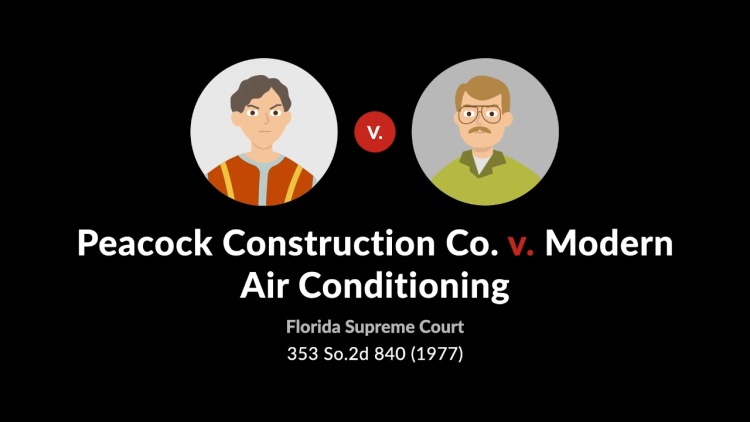Peacock Construction Co. v. Modern Air Conditioning, Inc.
Florida Supreme Court
353 So.2d 840 (1977)

- Written by Christine Hilgeman, JD
Facts
Peacock Construction Co. (Peacock) (defendant), as general contractor for a condominium project, entered into subcontracts with Modern Air Conditioning, Inc. (Modern Air) (plaintiff) and Overly Manufacturing (Overly) (plaintiff). Both subcontracts contained an identical clause requiring final payment by Peacock to Modern Air and Overly within 30 days after “completion of the work…written acceptance by the Architect and full payment therefor by the Owner.” Upon completion of their work, Modern Air and Overly requested final payment and Peacock refused. When Modern Air and Overly brought actions for breach of contract, Peacock defended that full payment had not been received from the owner and such payment was a condition precedent to its obligation to pay on the subcontracts. The trial courts ruled in favor of Modern Air and Overly on their motions for summary judgment. On appeal, the Second District Court of Appeal affirmed the trial courts' decisions and held that the contractual provision at issue was not a condition precedent. Instead, the Court of Appeal interpreted the provision as an absolute promise to pay that fixed payment by the owner as a reasonable time when payment should be made to the subcontractors. Certiorari was granted and the cases were consolidated for appeal to the Supreme Court of Florida.
Rule of Law
Issue
Holding and Reasoning (Boyd, C.J.)
What to do next…
Here's why 907,000 law students have relied on our case briefs:
- Written by law professors and practitioners, not other law students. 47,100 briefs, keyed to 996 casebooks. Top-notch customer support.
- The right amount of information, includes the facts, issues, rule of law, holding and reasoning, and any concurrences and dissents.
- Access in your classes, works on your mobile and tablet. Massive library of related video lessons and high quality multiple-choice questions.
- Easy to use, uniform format for every case brief. Written in plain English, not in legalese. Our briefs summarize and simplify; they don’t just repeat the court’s language.





